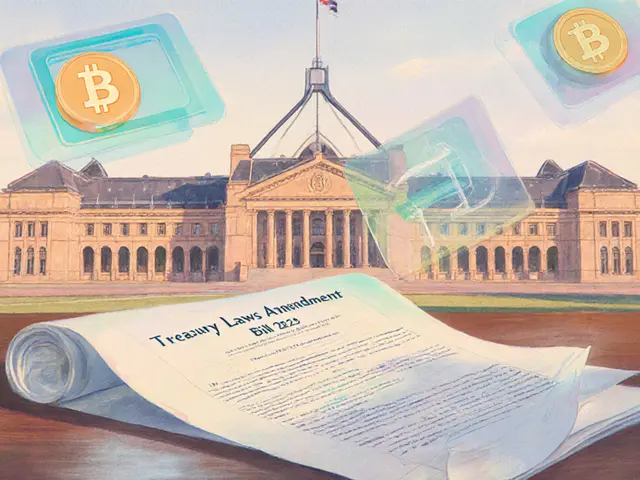Why the UAE Is the Fastest‑Growing Global Crypto Hub

UAE Crypto Hub Licensing Calculator
Estimated Licensing Requirements
Securities and Commodities Authority (SCA)
Federal regulator overseeing investment-grade virtual assets treated as securities.
Central Bank of the UAE (CBUAE)
Regulates payment tokens and ensures monetary policy compliance.
VARA
Dubai’s dedicated crypto regulator covering exchanges, custody, wallets, and token issuance.
DFSA
Dubai International Financial Centre regulator applying traditional financial services framework.
FSRA
Abu Dhabi Global Market regulator adopting risk-based approach with unique licensing categories.
Important Note
This calculator provides estimates only. Actual licensing costs may vary based on business complexity, due diligence findings, and regulatory updates. Always consult with a qualified legal advisor before making decisions.
Looking for a jurisdiction that mixes crystal‑clear rules, tax perks, and a strategic location? The United Arab Emirates (UAE) has turned that search into a checklist. In the past three years the emirates have become the go‑to address for exchanges, token issuers, and custodians that need legitimacy without sacrificing speed.
Key Takeaways
- Federal bodies (SCA, CBUAE) and free‑zone regulators (VARA, DFSA, FSRA) deliver a layered but coherent framework.
- Licensing fees start at AED 100,000 (≈$27k) and capital requirements ceiling at AED 1.5million.
- VAT on virtual‑asset transactions is zero and full crypto‑tax reporting begins in 2027 under CARF.
- Major players such as Binance, Crypto.com, Bybit, BitGo and Laser Digital already operate from the UAE.
- Geographic proximity to Asia, Europe and Africa makes the UAE a true bridge for crypto businesses.
What Makes the UAE a Crypto Hub?
At its core, the UAE blends government ambition with market‑friendly policies. The 2022 Cabinet Resolution No. (111) laid the legal groundwork for virtual‑asset service providers (VASPs) across all emirates, including the free zones that host most of the industry’s activity. The result is a UAE crypto hub that offers both regulatory certainty and the flexibility needed by fast‑moving blockchain firms.
Regulatory Landscape - From Federal to Free‑Zone
Understanding who does what is the first step for any firm planning to set up shop.
Securities and Commodities Authority (SCA) is the federal regulator that oversees investment‑grade virtual assets, treating many tokens as securities. Its remit covers licensing, AML/CFT supervision, and ongoing compliance for any crypto activity that falls under securities law.
Central Bank of the UAE (CBUAE) concentrates on payment tokens, ensuring that stablecoins and other mediums of exchange meet monetary‑policy standards.
Within the free zones, three specialised authorities issue licences tailored to the type of service offered:
- Virtual Assets Regulatory Authority (VARA) - Dubai’s dedicated crypto regulator, launched in 2022. VARA covers exchange services, broker‑dealer activities, custody, wallet provision, token issuance and transfer services.
- Dubai Financial Services Authority (DFSA) - the regulator for the Dubai International Financial Centre (DIFC). It applies a traditional financial‑services regime to crypto firms operating inside the DIFC.
- Financial Services Regulatory Authority (FSRA) - the Abu Dhabi Global Market (ADGM) regulator. FSRA adopts a risk‑based approach similar to DFSA, but with its own licensing categories.
How to Get Licensed - A Step‑by‑Step Blueprint
While each authority has its own forms, the core steps are alike. Below is a practical roadmap that works for most business models.
- Choose the right jurisdiction. Decide whether your activity aligns best with VARA (Dubai), DFSA (DIFC) or FSRA (ADGM). For pure‑play exchange services, VARA is usually the quickest path.
- Incorporate locally. Set up a UAE‑registered company (LLC or PSC) in the chosen free zone. Incorporation fees range from AED 15,000 to AED 30,000.
- Fit‑and‑proper assessment. Submit personal and corporate background checks. The authorities look for clean AML records, sufficient expertise and solid governance.
- Prepare a detailed business plan. Include market analysis, technology stack, risk‑management procedures, and AML/CFT policies. VARA requires a minimum 12‑month operational forecast.
- Meet capital and insurance requirements. Paid‑up capital starts at AED 100,000 for wallet providers and can go up to AED 1.5million for full‑scale exchanges. Professional liability insurance (minimum AED 500,000) is mandatory for custodial services.
- Submit the application. Application fees are AED 40,000-AED 100,000 depending on licence type. Expect a 4‑12 week review period.
- Pass the technical audit. Authorities will scrutinise your cybersecurity framework, cold‑storage solutions and transaction‑monitoring systems.
- Obtain the licence and start operations. Once granted, you must pay an annual supervision fee (AED 80,000-AED 200,000) and adhere to quarterly reporting obligations.
Tax Environment - VAT Exemption & CARF Reporting
Tax efficiency is a major draw for crypto firms. Since November152024, the UAE has exempted most virtual‑asset transactions from the standard 5% VAT, cutting costs for both businesses and end‑users.
The upcoming Crypto‑Asset Reporting Framework (CARV) will align the UAE with OECD standards. Key points:
- Reporting obligations start on January12027 for all VASPs.
- Data to be shared includes transaction amounts, asset types (BTC, ETH, NFTs, etc.), customer identification, and residency status.
- First automatic exchange of crypto tax data with foreign jurisdictions is slated for 2028.
- Public consultation on the final rules runs until November82025, with the final decree expected in 2026.
For most businesses, the VAT exemption outweighs the upcoming reporting burden, especially because the framework is designed with existing AML/CFT systems in mind.

Business Advantages Beyond Regulation
Regulation is only part of the story. The UAE also offers:
- Strategic location. Dubai’s airport and seaport link Asia, Europe and Africa in under 6hours, reducing latency for high‑frequency trading.
- Government incentives. The Ministry of Economy runs the “Dubai Crypto Valley” programme, providing subsidised office space and fintech grants.
- Talent pool. Thousands of fintech professionals migrate annually, and local universities now teach blockchain development as a core subject.
- World‑class infrastructure. 5G coverage, data‑centre hubs, and a stable power grid support 24/7 operations.
UAE vs. Other Crypto Hubs - A Quick Comparison
| Jurisdiction | Regulatory Clarity | Licensing Cost (USD) | VAT / GST | Crypto‑Tax Reporting | Geographic Advantage |
|---|---|---|---|---|---|
| UAE (VARA/DFSA/FSRA) | High - detailed 2022‑2025 framework | 27k - 408k | 0% on crypto | CARF starts 2027 | Middle East hub, 6‑hour reach to EU/Asia |
| Singapore | Medium - MAS guidelines | 30k - 300k | 7% GST (exempt for crypto) | Income tax on gains | Gateway to Southeast Asia |
| Switzerland (Zug) | High - Crypto Valley statutes | 50k - 500k | 7.7% VAT (exempt on crypto) | Self‑assessment, no automatic exchange | EU proximity, stable political climate |
| Malta | Medium - Virtual Financial Assets Act | 20k - 250k | 18% VAT (exempt on crypto) | Annual filing, no automatic exchange | EU access, English legal system |
Real‑World Examples - Who’s Already in the UAE?
Big names have taken notice. Binance opened a regional office in Dubai in 2023, citing the “clear licensing path with VARA”. Crypto.com set up a crypto‑asset custody hub in the ADGM, leveraging the FSRA’s strong AML framework.
Institutional custodians are also flocking. BitGo launched a compliance‑grade vault in Abu Dhabi, while Laser Digital obtained a VARA licence to issue tokenised real‑world assets.
Future Outlook - What’s Next for the UAE Crypto Scene?
The roadmap shows more than just regulatory tweaks. The government is investing in a national blockchain strategy that includes a sovereign digital‑currency pilot, an AI‑driven AML monitoring platform, and incentives for real‑world‑asset (RWA) tokenisation projects. By 2028, the UAE aims to host over $200billion in tokenised assets, according to the Ministry of Economy.
For businesses, the take‑away is simple: the UAE provides a durable, forward‑looking platform that will keep evolving alongside the market. Early adopters stand to lock in lower fees, stronger brand credibility, and access to a rapidly expanding investor base across three continents.
Quick Checklist - Do You Have What It Takes?
- Clear business model (exchange, custodial, token issuance, etc.)
- Fit‑and‑proper shareholders and directors
- Technology stack that meets VARA/DFSA/FSRA security standards
- Paid‑up capital within the required range
- AML/CFT policies aligned with SCA guidelines
- Readiness to submit CARF data from 2027 onward
Frequently Asked Questions
Is a UAE crypto licence mandatory for all virtual‑asset services?
Yes. Any entity that offers exchange, custodial, broker‑dealer, wallet or token‑issuance services must hold a licence from one of the recognised regulators (VARA, DFSA, FSRA, or SCA for securities‑type tokens). Operating without a licence can lead to fines, asset freezes, and reputational damage.
How long does the licensing process usually take?
The timeline varies by regulator and licence type, but most applicants receive a decision within 4 to 12 weeks after submitting a complete dossier. Complex token‑issuance applications can take up to 16 weeks.
Do I need to pay VAT on crypto transactions?
No. Since November152024, the UAE has exempted most virtual‑asset trades from the standard 5% VAT, making transactions cheaper for both businesses and users.
What are the capital requirements for a crypto exchange licence?
Paid‑up capital must be at least AED 500,000 (≈$136,000) for a basic exchange, rising to AED 1.5million (≈$408,000) for full‑service platforms that also provide custodial and token‑issuance functions.
Will I need to submit data under the CARF framework?
Yes. Starting 2027, all licensed VASPs must report transaction details, customer identities and residency information to the UAE tax authority. The system is designed to work with existing AML databases, so integration is straightforward.







The UAE’s hype train is nothing more than a government‑backed circus, selling the illusion of regulatory clarity while demanding hefty fees that only benefit the elite few who can afford them.
Honestly, the UAE is trying to copy what we’ve been doing in Africa for years – offering cheap, tax‑free crypto zones. Nigeria already has a thriving ecosystem, but they scream louder because they have more dollars to throw around.
Wow this article is a lot of info i feel like i just skimmed through a whole textbook about crypto rules and benefits and the UAE seems to be doing a good job at balancing speed and security and i kinda wish more places would follow suit
Reading through the regulatory mosaic of the UAE feels like wandering through an intricate tapestry, each thread representing a different authority yet weaving together a coherent picture of opportunity. The balance between federal oversight and free‑zone flexibility is a metaphor for how governance can adapt without stifling innovation.
I think it’s cool how the UAE managed to create a space where crypto firms can actually operate with certainty, especially when a lot of jurisdictions are still stuck in a regulatory gray area. It shows that a government can be both ambitious and pragmatic.
Exactly! If you’re looking to set up shop, start by picking the right free‑zone – VARA for a quick exchange licence, DFSA if you want the DIFC vibe, or FSRA for a risk‑based approach. Then make sure your AML/CFT policies line up with SCA standards, lock in the capital, and you’ll be good to go 🚀✨.
From a compliance engineering perspective, the multi‑jurisdictional model in the UAE provides a layered architecture for risk mitigation, but the operational overhead can be non‑trivial, especially when integrating disparate AML/KYC APIs across VARA, DFSA, and FSRA frameworks.
One could argue that the UAE’s approach is a philosophical experiment in regulatory pluralism, where the coexistence of federal and free‑zone statutes creates a dialectic between central authority and localized autonomy, ultimately driving evolutionary governance.
Let’s keep the momentum going! If you’re a startup, tap into the Dubai Crypto Valley program – it’s not just about lower fees, it’s about mentorship, networking, and a chance to showcase your solution on a global stage.
Sounds like another overhyped tax haven.
From an ethical standpoint, it is imperative that jurisdictions such as the United Arab Emirates do not become mere sanctuaries for illicit financial flows. By imposing rigorous AML/CFT standards and transparent reporting mechanisms, they uphold the moral fabric of the global financial system.
That’s a naive view – the UAE is clearly positioning itself as the frontline of legitimate crypto commerce, not a backdoor for bad actors. Their proactive stance on CARF reporting reinforces that commitment.
Optimism works wonders – the UAE’s roadmap shows a clear vision for tokenised assets, and that should inspire confidence for anyone considering expansion into the Middle East.
First off, the UAE’s regulatory scaffolding offers a level of predictability that is rare in the crypto world. Second, the capital requirements, while significant, are tiered in a way that aligns with business scale, allowing startups to enter the market without drowning in fees. Third, the exemption from VAT on crypto transactions directly reduces operational costs, giving firms a competitive edge. Fourth, the upcoming CARF framework, despite sounding bureaucratic, actually standardises reporting and could simplify cross‑border compliance. Fifth, the strategic geographic positioning creates latency advantages for high‑frequency trading, especially for firms servicing both Asian and European markets. Sixth, the government‑backed incentives such as the Dubai Crypto Valley programme provide not just financial subsidies but also mentorship networks. Seventh, the talent pool in the UAE is rapidly expanding, with universities now offering dedicated blockchain curricula. Eighth, the robust digital infrastructure, including ubiquitous 5G and data‑centre hubs, ensures reliable uptime for 24/7 crypto operations. Ninth, the presence of industry giants like Binance and Crypto.com validates the ecosystem’s credibility. Tenth, the layered regulatory approach-federal SCA oversight combined with free‑zone flexibility-offers both security and agility. Eleventh, the licensing process, typically within 4‑12 weeks, is remarkably swift compared to other jurisdictions. Twelfth, the insurance requirements, though mandatory for custodial services, protect both firms and consumers against systemic risks. Thirteenth, the clear roadmap towards a sovereign digital currency signals forward‑looking policy that could unlock new financial products. Fourteenth, the collaborative environment among regulators, firms, and academia fosters innovation. Fifteenth, the overall ecosystem is designed to evolve, meaning early adopters will likely reap long‑term benefits as the market matures.
Excellent breakdown! Each point you made ties back to the core advantage of operating in the UAE – regulatory clarity paired with business‑friendly incentives. The emphasis on talent development and infrastructure especially resonates with firms looking for sustainable growth.
I agree, the UAE seems to strike a good balance between oversight and flexibility.